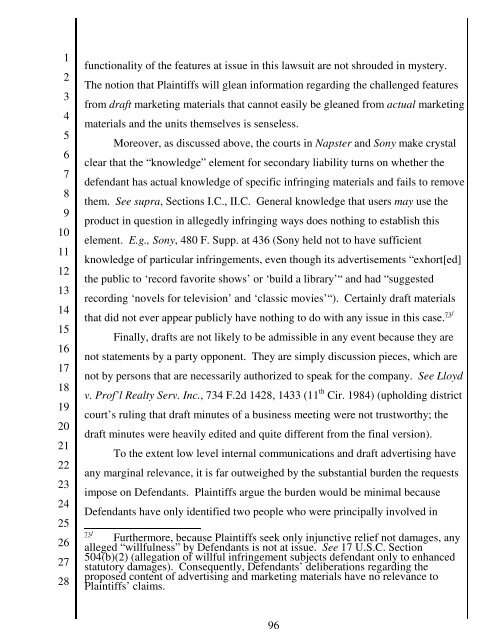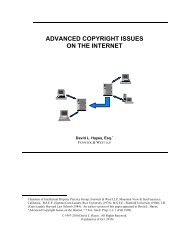Paramount Pictures Corporation v. ReplayTV, Inc., Joint Stipulation ...
Paramount Pictures Corporation v. ReplayTV, Inc., Joint Stipulation ...
Paramount Pictures Corporation v. ReplayTV, Inc., Joint Stipulation ...
Create successful ePaper yourself
Turn your PDF publications into a flip-book with our unique Google optimized e-Paper software.
12345678910111213141516171819202122232425262728functionality of the features at issue in this lawsuit are not shrouded in mystery.The notion that Plaintiffs will glean information regarding the challenged featuresfrom draft marketing materials that cannot easily be gleaned from actual marketingmaterials and the units themselves is senseless.Moreover, as discussed above, the courts in Napster and Sony make crystalclear that the “ knowledge” element for secondary liability turns on whether thedefendant has actual knowledge of specific infringing materials and fails to removethem. See supra, Sections I.C., II.C. General knowledge that users may use theproduct in question in allegedly infringing ways does nothing to establish thiselement. E.g., Sony, 480 F. Supp. at 436 (Sony held not to have sufficientknowledge of particular infringements, even though its advertisements “ exhort[ed]the public to ‘record favorite shows’ or ‘build a library’ “ and had “ suggestedrecording ‘novels for television’ and ‘classic movies’ “ ). Certainly draft materialsthat did not ever appear publicly have nothing to do with any issue in this case. 73/Finally, drafts are not likely to be admissible in any event because they arenot statements by a party opponent. They are simply discussion pieces, which arenot by persons that are necessarily authorized to speak for the company. See Lloydv. Prof’l Realty Serv. <strong>Inc</strong>., 734 F.2d 1428, 1433 (11 th Cir. 1984) (upholding districtcourt’ s ruling that draft minutes of a business meeting were not trustworthy; thedraft minutes were heavily edited and quite different from the final version).To the extent low level internal communications and draft advertising haveany marginal relevance, it is far outweighed by the substantial burden the requestsimpose on Defendants. Plaintiffs argue the burden would be minimal becauseDefendants have only identified two people who were principally involved inFurthermore, because Plaintiffs seek only injunctive relief not damages, anyalleged “ willfulness” by Defendants is not at issue. See 17 U.S.C. Section504(b)(2) (allegation of willful infringement subjects defendant only to enhancedstatutory damages). Consequently, Defendants’ deliberations regarding theproposed content of advertising and marketing materials have no relevance toPlaintiffs’ claims.73/96
















